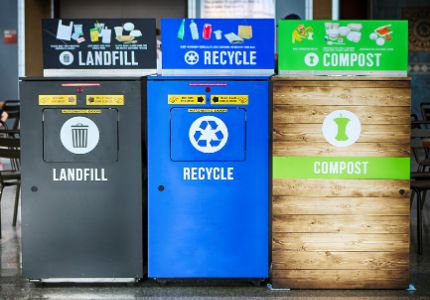Resources for Non-Local Entities
Non-local entities must maintain mandatory commercial recycling and organic recycling programs, including ensuring that properly labeled recycling containers are available to collect bottles, cans, paper, cardboard, food waste, and other recyclable materials.
SB 1383 expands the definition of organic waste to include food scraps, landscape and pruning waste, organic textiles and carpets, lumber, wood, manure, biosolids, digestate, and sludges.
Non-local entities include:
- Special districts
- Federal facilities
- Prisons
- State park facilities
- Public universities and community colleges
- County fairgrounds
- State agencies
Collection Requirements
Non-local entities must recycle their organic waste either by:
- Subscribing to a collection service that the jurisdiction provides OR
- Contracting for collection services independently OR
- Self-hauling organic waste to a specified composting facility, community composting program, or other collection activity or program.
Education
Non-local entities must educate employees about organic waste prevention. They must periodically:
- Inspect organic waste containers for contamination
- Inform employees if containers are contaminated and
- Instruct employees on how to properly sort material into the correct containers.
Clear signage and container labeling encourages proper sorting and minimizes contamination.

Containers
Non-local entities must provide containers to collect organic waste and recyclables in all areas where disposal containers (trash cans) are provided, except in restrooms.
However, a non-local entity is not required to provide containers if a specific material type is not generated in a particular space (e.g., food waste in a classroom or office).
Containers must conform to the proper color or labeling requirements:
- Existing internal organics collection containers can still be used until they are no longer functional or until January 1, 2036, whichever comes first, as long as they are the correct color.
- Alternatively, containers may have labels added that identify accepted and prohibited materials.
- Containers must have a body or lid that conforms to the container colors OR must have container labels on new containers that comply with the labeling requirements.
- Example: If the collection service is a 3-container system, then a green, blue, and gray internal container is required, or the 3 internal containers need to be labeled appropriately.
Non-Local entities must ensure new containers are properly labeled by:
- Placing labels on containers that include language or graphic images, or both, that indicate the primary materials accepted and the primary materials prohibited in that container or
- Providing containers with imprinted text or graphic images that indicate the primary materials accepted and the primary materials prohibited in that container.
- Labels shall clearly indicate the primary items that are prohibited container contaminants for each container.
- Non-local entities may comply by using model labeling provided by CalRecycle.
Waivers
Non-local entities can apply to CalRecycle to waive their obligation to comply with some or all of the organic waste collection service requirements (14 CCR Section 18986.3(a)).
Visit the Department Approved Waivers web page for more information.
Commercial Edible Food Generator Requirements for Non-Local Entities
Non-local entities that generate food waste may be required to donate edible food to local food recovery services and organizations. SB 1383 places commercial edible food generators into two tiers, and non-local entities may meet the definition in either tier.
Federal facilities are not required to implement edible food recovery programs, but may do so voluntarily.
- Visit the Food Recovery page for more information on food recovery
- Determine if your non-local entity is a Commercial Edible Food Generator
Once a non-local entity is identified as a commercial edible food generator, it must follow the commercial edible food generator requirements.
Non-Local Entities are required to keep records however, there are no reporting requirements. CalRecycle may request records during a site visit.
Education and Outreach Resources
Non-local entities are required to provide:
- Adequate bins
- Signage, staffing and
- Educate employees and non-employee populations (if applicable) about recycling and organics recycling program participation.
Waste Management for State Agencies
State agencies have been paving the way with mandatory commercial recycling and organics recycling.
For more information contact: Short-Lived Climate Pollutants (SLCP), Organic Waste Methane Emissions Reductions, SLCP.Organics@calrecycle.ca.gov

